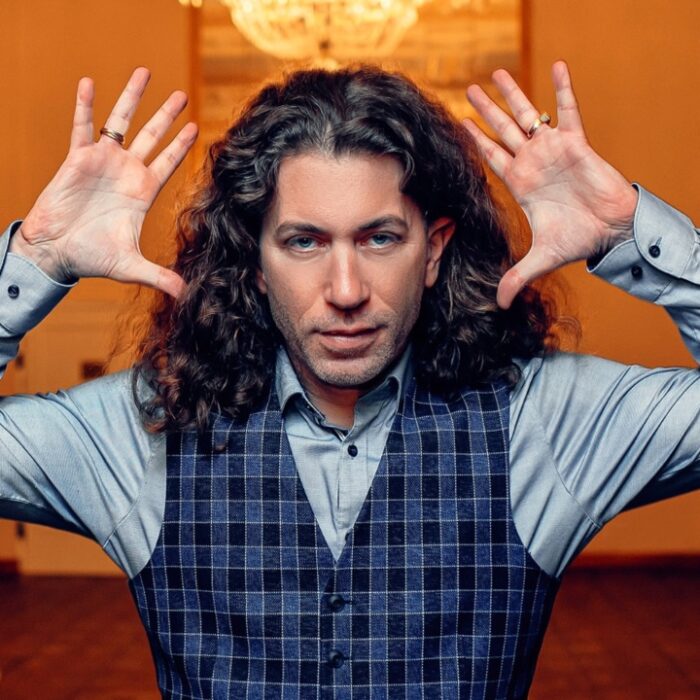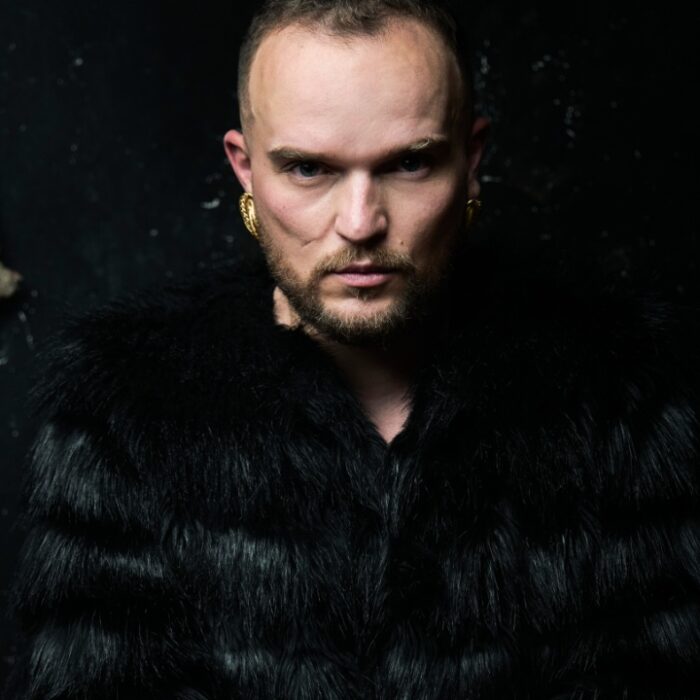
Q & A: Staff Sgt. 1st Class Ben Hilgert & Soprano Tess Altiveros on the upcoming Arizona Opera production of ‘The Falling and the Rising’
By Matt CostelloArizona Opera’s upcoming production of “The Falling and the Rising” is an operatic story of the unique service of those in the military who face danger, often paying the price of a great sacrifice. Staff Sergeant Ben Hilgert, serving in the Soldiers’ Chorus of the U.S. Army Field Band, is the visionary of the piece. His passion to tell this important story as an opera led to him to conduct interviews with wounded soldiers at Walter Reed National Military Medical Center. Then, working with librettist Jerre Dye and composer Zach Redler, the unique opera took shape…
The story centers around a strong female hero known only as “Soldier.” Soldier is severely wounded by a roadside bomb and, as she is placed under a medically induced coma, she experiences visions of other soldiers’ stories, each on their journey toward healing and home.
OperaWire spoke to Sergeant Hilgert along with soprano Tess Alitveros, who originated the role of the “Soldier” for the Seattle premiere, and who will also sing the role for the Arizona Opera production.
OperaWire: Ben, what was your journey to go from an idea you had, something you felt strongly about, to take that idea all the way to a finally finished work? Any unexpected difficulties or special support you encountered along the way?
Ben Hilgert: First, allow me to clarify for readers that when the idea struck, I had no experience in commissioning new opera. None. The entire journey was made possible by the incredible willingness of both my Army and opera communities to hold my hand in bringing this piece into existence.
I was inspired after spending time at an OPERA America conference in 2015 looking for new ways to collaborate and use some of the fantastic operatic talents that we have in the Soldiers’ Chorus. I walked away from my time at the conference with a feeling that the entire industry longed for a new way to build community through opera. At The US Army Field Band, as Musical Ambassadors, our mission is to connect Americans to their Army and honor the service of those who have given so much. Something just clicked into place for me.
I had been in the Soldiers’ Chorus for almost five years. From experience, I knew that when we, as Soldiers, walk into a concert venue in uniform, we experience a connection to the audience that I’ve never felt in any of my performances outside of the Army. We represent something that is so much greater than the sum of its parts, the service of men and women from all generations who have sworn to protect and defend the constitution of the United States against all enemies.
I found myself in my commander’s office the following day pitching the idea of commissioning an opera. He said yes, and I had no idea what I signed myself up for! I immediately reached out to mentors past and present for advice about where to start. I knew that I wanted to tell a more universal, less historical, very human story about what military service is like. Every part of me was energized by the thought of creating something meaningful, a piece of art from nothing.
There was no precedent for this experiment in American military band history, creating both challenges and unexpected difficulties.
First up: what story should we tell? I had seen one of Jerre Dye’s pieces (his very first opera libretto) featured on the New Works Sampler at conference and was stunned by Jerre’s language and ability to communicate emotion theatrically. Ned Canty, general director at Opera Memphis and the person who had commissioned that piece, “Ghosts of Crosstown,” took time to talk to me about the way that piece was created through interviews in a specific community in Memphis. One of Jerre’s many gifts is collecting interviews and turning them into theatrical works. Jerre, the first artist we contacted, signed on, followed soon after by Zach Redler, an immediate fit.
OW: Tess, the character of the soldier must have felt different, in so many ways, from the many roles you have performed in the classic repertoire. Can you describe what that was like…what inspired you, and how did you prepare to undertake this very different ‘role’?
Tess Altiveros: I think there’s always a particular responsibility an artist bears whenever tasked with the telling of a true story. However, because ‘The Falling and the Rising’ tells so many veteran stories that are still being lived every day, and because we get to share the stage with a community of veterans — this piece feels supercharged with that responsibility.
And to tell the truth, even as I first began learning the role, I was not prepared for the way in which taking on this material and working with these vets would impact my perspective. It really demanded that I look outside my own assumptions and step into the life experience of so many of my countrymen. What’s more, it inspired me to ask about the stories of service within my own family. I had never asked about this before, and I was stunned to learn not only how many in my family have served and in what capacity, but just how little I knew about their stories. It has been an extraordinarily humbling experience.
OW: And as you prepared, did you note a different, perhaps unfamiliar impact the powerful material was having on you?
TA: Having not grown up with immediate family members in the armed forces, this was a real impetus for looking at my own preconceived ideas – dare I say my own ignorance – about what it means to enlist and serve. I’m just speaking for myself, but I have a hunch it was cause for a sea change in world views for many of us on the creative team.
OW: Ben, the opera is focused on the healing process, as experienced by the lead ‘soldier’ in a coma…and the other soldiers who appear, all dealing with healing and recovery in a different way. These are based in part on your interviews at Walter Reed Hospital…
As you heard those stories, what most surprised you about those real experiences of war and life-changing wounds? Did you feel that in those interviews you uncovered something vital to that sacrifice and healing, something that must be core to the opera?
BH: The story was heavily influenced by our interviews at Walter Reed National Military Medical Center. However, finding the story of healing was largely unintended. We spoke with Soldiers across all occupations, ranks, ages, backgrounds.
Interviews also took place with members of the 3rd Infantry Regiment, The Old Guard, at Fort Myer in Virginia; a variety of service members at Fort Meade, Maryland; and a few via phone or video conference. In trying to bridge the gap between Civilian and Military, we were looking to capture a broader sense of what service feels like in the words of Soldiers.
To be honest, Zach, Jerre, and I had no idea what to expect when we sat down with our first interviewees. We had planned a list of around 12 questions in order to shape the conversation towards our project’s aspirational goals, but went in with open hearts, minds, and ears. Those three days of interviews changed my life in more ways than I can write about.
The biggest surprise was the strength and resiliency found in each and every Soldier we spoke with. While any given Soldier’s challenges were often many and varied, the interviews left us listeners with an appreciation for a sense of purpose derived from a deep devotion to duty.
Here we were talking to a few of the interviewees with life-altering injuries. It was almost as if the more a person had suffered, the more simple wisdom they had to impart. Those who experience the opera will hear some of the words and phrases that had the most profound impact.
OW: Tess, when you first were introduced to the character of the soldier, wounded by a road-side explosive, what did you — as a performing artist but also personally — find most compelling?
TA: For me personally, the thing I found immediately compelling is Female Soldier’s sense of duty both as a soldier and a mother; and the beautiful and honest way in which it is set to music.
As a mom myself, it has been immensely gratifying to have the opportunity to bring to the stage some of the beautiful, complicated, painful, messy and inspiring experiences of a mother torn between duty and family—and really honor the sacrifices of moms (and their kids) who enlist to serve their country.
OW: Ben, can you talk about your interaction with both the librettist, Jerre Dye, and the composer Zach Redler. How did the collaboration of the “visionary” of the piece with the creators of the actual text, stories and music go?
BH: I could not have asked for a more patient and wonderful artistic team. It was clear from our first conversations that we had a natural chemistry together. Jerre and I had been talking for about 6 months about the aspirations and structure of the piece when Zach was brought on board. They had previously collaborated on a short piece called “Moving Up.” Jerre has since referenced their natural ability to understand what the other is thinking as “dolphin speak.”
OW: How did it feel then to see it finally taking shape? Were there any concerns?
BH: My most significant contributions to the creative trio come from those early conversations with Jerre and then Zach about what we wanted the piece to feel like. As a producer, I sought desperately to make sure that the piece would resonate with communities who don’t speak through Army acronyms. The whole idea of the project was to use opera, the power of theater combined with the universal language of music, to take an audience who may or may not have any connection to military service and transport them into the life of a service member. That’s a big ask for the most capable storytellers.
After the interviews, there was a period of checking in as Jerre and Zach created, but eagerly anticipating the delivery of the libretto. So many people had invested time and energy into our vision. After all of the work to bring the many partnering organizations to the table, I now had to wait and see what Jerre and Zach would create.
It was the thrill of my life (and it continues to be so) to watch an idea turn into a work of art that is being performed all over the country. I have been a kid in a candy store for most of the journey. The piano/vocal workshop stands out as the moment I will always remember. I never imagined myself sitting at the table with Zach, Jerre, and the incredible production team at Seagle Music Colony and working with them to craft the show into what it is today.
As for concerns, anyone who has been involved in bringing any opera to life onstage knows just how tenuous and terrifying it is right up until the curtain opens. So many things can go wrong. If you’ve never commissioned a new opera, or produced a world premiere, in my experience the level of concern is exponentially larger.
Let me be clear, as amazing as my job as a Soldier Musician is, The US Army Field Band is not an opera company. We were not set up to create or produce a new opera. We took on every challenge one step at a time because that was my only option.
OW: Ben, can you talk about the contributions of others in the production, especially how the “set” and its images support the other soldiers and their stories, as experienced by the audience and the lead ‘soldier’ Tess?
BH: I haven’t yet seen Arizona Opera’s production, but I know that they have followed through with the spirit of the project. The opera was meant to build community. Arizona Opera is doing that in many ways. They are engaging the local veterans community, creating dialogue around the performances, and forging connections that did not previously exist. Watching new artists – opera producers, stage directors, actors, and design teams – interpret the story and its messages in new and powerful ways is my favorite part of every new production.
OW: Having performed the work before audiences in Seattle, what was the effect you each noticed, or even felt, from the audience, many of whom only knew of such amazing sacrifices from the news?
BH: This story is powerful. As one of our aspirational goals, we wanted to give substance and meaning to the word sacrifice. Having seen many performances and different productions, I can say that I think “The Falling and the Rising” does that better than we had hoped.
TA: During and after our performances in Seattle, it was pretty apparent that audiences were profoundly moved. My castmates and I were approached every night by teary-eyed civilians and veterans (we were always teary-eyed too!) who felt that the piece had spoken to them in a really significant way; and even from the stage we could hear the little telltale sniffles and laughs or sometimes a great release of breath at the final blackout. It felt like one of those powerful occasions where art created a space for us to experience reflection and gratitude all together.
OW: Finally, with the Arizona production just weeks away, and having seen the opera taking shape again, soon ready for an audience to “participate” in the experience, what resonates most for you…about the opera’s message, and what the work says about the key ideas of sacrifice, loss and healing?
TA: For me, what has been foremost in my mind during this process in Arizona is the great need for human empathy towards each other’s stories and experiences. This piece serves so many purposes, but I particularly love that it is a vessel for empathy, for creating a bridge of understanding on a human level between veterans and civilians – an experience that allows us to connect to one other and listen for the humanity in all of our stories
BH: Coming back to this opera takes me back to the interviews. Every show I’m reminded, and humbled, that these are living stories. There are currently service members deployed in countries around the world on our behalf. I hope that participating in the experience of “The Falling and the Rising” brings audiences closer to understanding what it is that those men and women are going through.


